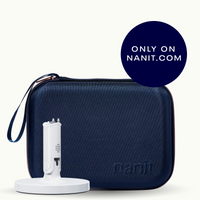You’ve welcomed your new bundle of joy, you’ve made it home from the hospital. And while there’s still plenty of gratitude and happiness, as the sleepless nights pile up, it must also be said…you’re bone deep tired. Like, to the core worn out. It’s hard to make so many decisions day in and day out, especially when someone else’s well being depends on them. And it’s a simple truth that round-the-clock caretaking is draining, both physically and mentally.
Existing in that space for too long—especially if you don’t have a lot of help—can cause any parent to burn out. Which is important to pay attention to. Because yes, parental burnout is a real thing. In fact, one study found that up to 5 million U.S. parents experience it each year. And in 2018, researchers compiled a way to measure it—the Parental Burnout Assessment—and later studied more than 17,000 parents around the world to better understand what burnout looks like.
The results can be broken down into a few stages: The first is exhaustion; parents of younger kids tend to experience more physical exhaustion, for parents of older kids, the fatigue is often mental. Next up is a tendency to distance yourself from your kids to preserve energy. And lastly, parents experiencing burnout may feel trapped in their roles and/or guilty that they’re not the parent they once were or want to be.
At Nanit, we want to help support parents in whatever ways we can, so you can avoid losing yourself amidst all your new and ongoing responsibilities and prevent burnout before it even happens. It’s one of the reasons we developed our Care Logs feature: to share in the caregiving responsibilities so you don’t have to juggle them all on your own.
Care Logs (also commonly known as baby trackers or baby logs) are an easy way for you—and anyone else who is part of your caregiving team—to keep track of your child’s basic, important day-to-day activities. Easy to forget details such as when your child last fed and how much and diaper changes. And you can log in all the details in the same Nanit app that you already use to monitor your baby’s sleep and milestones. Start using the Logs early so they can support you through those first few sleep-deprived months. They’ll also be your trusty assistant as your little one grows.
But how exactly do Care Logs help with parental burnout? In several important ways:
1. They lessen your mental load.
Because Care Logs serve as a baby tracker, letting you note down all your baby’s eating, sleeping, even pooping details, you are relieved of the burden—and the resulting stress—of trying to remember all that info yourself. Instead, in one glance at the app, you’ll get all the data you need about your baby’s activities and overall well being. Think of it as your baby’s wellness log or care diary!
2. They allow you to share caregiving responsibilities.
Care Logs can be accessed by your partner, a babysitter, or any member of your caregiving team. Since you can easily loop another person in on any pertinent info, you’ll be able to share your parenting duties and take a break when you need to. Plus, your partner will be able to note whatever happens for you to see later on.
3. Care Logs streamline your to-do lists.
It’s hard enough to stay on top of all that you’ve got going on. But when you have to log in breastfeeding minutes in one care journal, diaper changes in another baby diary…too much! With Care Logs, all the important wellness details get to be in the same baby log.
4. Care Logs and Nanit offer personalized tools.
Leaning on parenting tech can help a burned out parent feel less overwhelmed. Nanit’s app uses data compiled from monitoring to offer data, insights, and tips tailored to your child’s data, helping you understand their sleep and development. Pair these with the baby wellness tracker abilities of Care Logs and you have an overarching perspective of your child’s activities and wellbeing, to help you make confident decisions about their routines.
5. Notice—and celebrate—your child’s progress.
Being kind to yourself is another important aspect of recovering from burnout. There’s no such thing as the perfect parent and being able to see even little wins in the care diary—your baby is pooping enough!—can help you find things to be grateful for and shift your perspective.
6. Care Logs help you take better care of yourself.
Care Logs can assist you in establishing routines and make it easier for others to help out, so you can get the sleep you need at night and the peace of mind you need during the day.
Talking about how worn out you feel can be another huge part of preventing and recovering from burnout. So connect with our Nanit Community, your partner, or a medical professional whenever you need support. And learn more about all the ways Care Logs can be your parenting sidekick:



































